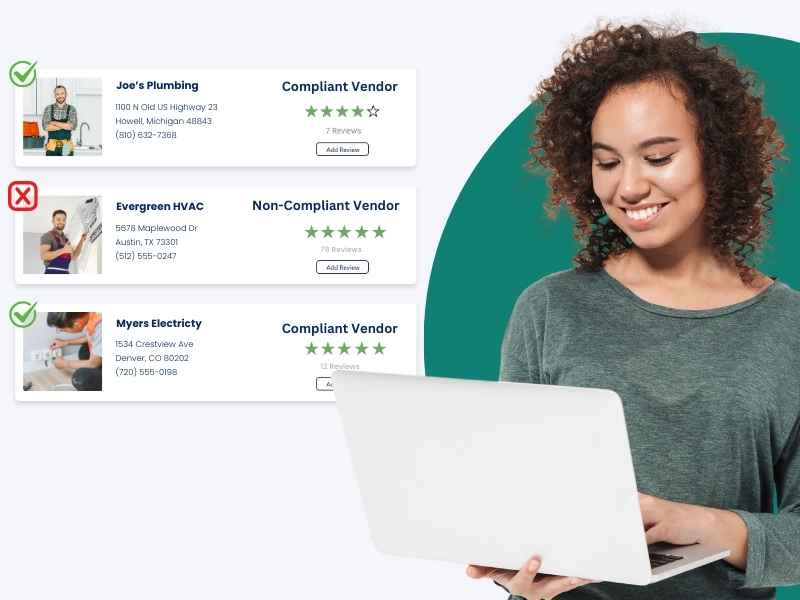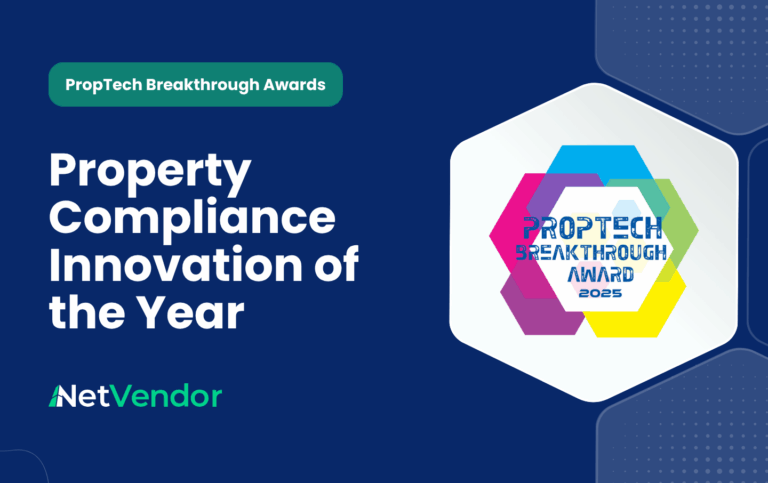Every property management team works with vendors. That said, not every vendor is a safe bet. One uninsured contractor, one expired license, or one overlooked safety requirement can expose your company to lawsuits, fines, and reputational damage. The reality is simple: vendor compliance is the front line of risk management in property operations.
Yet compliance often feels overwhelming. Property teams are buried in Certificates of Insurance (COIs), contracts, and renewal dates, all while trying to keep tenants happy and owners confident. Without the right systems, things slip through the cracks…and the costs are high. In fact, non-compliance can result in penalties, lawsuits, or increased insurance premiums that directly erode profitability.
Strong compliance doesn’t just protect against risk. It creates stability. It gives property managers peace of mind, reduces liability, and strengthens relationships with both owners and vendors. The question is no longer whether compliance matters, but how to manage it in a way that’s consistent, reliable, and scalable.
If you’re not sure where to start, we’ve built a simple resource to help. Download our Vendor Compliance Checklist for Property Managers, a one-page guide that covers the essential documents, standards, and monitoring steps every property team should have in place.
Vendor Compliance Is the First Line of Defense for Property Teams
Vendor compliance protects property management companies from legal, financial, and reputational risks. When vendors lack proper insurance, licenses, or safety practices, the liability often falls on the property management company.
For example, an uninsured contractor can leave your PMC paying out-of-pocket, while unsafe vendors destroy tenant and owner trust. Compliance stops these risks before they start—the first line of defense for every property team.

What Vendor Compliance Really Means in Property Management
Vendor compliance in property management means ensuring that every vendor meets the legal, financial, and operational standards required to work on a property. At a minimum, this includes insurance, licensing, safety, and regulatory obligations.
- Insurance, licensing, and certifications: Vendors must provide up-to-date Certificates of Insurance (COIs), state licenses, and trade certifications before approval.
- Health, safety, and environmental standards: Vendors must follow occupational safety rules and environmental regulations to protect tenants and staff.
- Accessibility, tenant rights, and local regulations: Property monitoring company Minut shares that compliance extends to areas like accessibility, privacy, and tenant protections, reinforcing why compliance is not optional.
Without clear compliance checks, property managers risk non-compliance with state laws, local safety codes, or tenant rights, exposing properties to preventable disputes.
Common Vendor Risks Property Managers Must Address
Inadequate insurance, expired licenses, weak safety practices, and vague contracts are the biggest vendor red flags. Proactive property managers shut down these risks with clear, proven compliance steps.
- Inadequate insurance coverage → Always collect and verify COIs. Don’t accept expired or incomplete documentation. Insurance compliance is one of the most effective safeguards against liability.
- Outdated or missing licenses → Establish a standard onboarding checklist for required trade licenses, renewing annually.
- Poor safety practices → Require vendors to comply with Occupational Safety and Health Administration (OSHA) standards and conduct periodic site audits.
- Weak contracts → AMPS Residential Experts (AMPSRE) emphasizes that contracts must clearly define liability, indemnification, and performance standards to prevent disputes.
Property managers can prevent each risk with upfront diligence and ongoing monitoring, avoiding costly disputes later.

Building A Vendor Compliance Program That Works
A strong compliance program is proactive, not reactive. It begins at onboarding and continues throughout the vendor relationship.
- Vendor onboarding best practices: Require insurance, licenses, COIs, and safety documentation up front. Automate collection where possible to reduce admin workload.
- Ongoing document monitoring and renewals: Compliance isn’t one-and-done. Insurance policies, certifications, and licenses expire. Regular monitoring prevents gaps.
- Audits, reporting, and continuous improvement: Conduct periodic compliance audits to identify weak points. Transparent reporting keeps owners informed and supports accountability.
Instead of relying on manual reminders, property managers can use NetVendor to keep compliance running in the background. Once standards are set, the platform enforces them automatically, ensuring no document slips through the cracks and giving your team valuable time back.
Vendor Compliance Software: What To Look For
Vendor compliance software streamlines the entire process by automating collection, monitoring, and reporting. The most effective systems include:
- Automated document collection & verification: Vendors upload insurance, COIs, and licenses directly, and the system automatically flags them if incomplete. Automation is the key to eliminating bottlenecks and reducing errors.
- Real-time compliance tracking & alerts: Property teams receive notifications when insurance expires or compliance status changes, preventing exposure.
- Integration with property management systems (PMS): Centralizing vendor data saves time and ensures consistency across accounting, operations, and procurement.
- Scalability for multi-property teams: Enterprise PMCs need software that can manage hundreds of vendors across multiple regions.
NetVendor was built with these needs in mind. Designed specifically for property management companies, the platform consolidates compliance into one place, featuring real-time dashboards, automated alerts, and seamless vendor onboarding. For teams juggling hundreds of vendors across multiple properties, that centralization is the difference between staying protected and falling behind.
Not sure where to start? Use our Vendor Compliance Checklist for Property Managers to see exactly what documents, standards, and processes you should have in place.
The ROI of Vendor Compliance for Property Management Companies
The ROI of vendor compliance comes from reducing non-compliance costs, increasing efficiency, and strengthening trust.
- Reducing costs of non-compliance: Fines, lawsuits, and insurance claims are expensive and often preventable with compliance software.
- Boosting operational efficiency: Automation reduces manual hours spent chasing paperwork, freeing staff for core operations.
- Strengthening vendor and owner relationships: Clear, consistent compliance builds trust with vendors while reassuring property owners that their assets are protected.
NetVendor makes this ROI achievable. By automating compliance tasks, property teams spend less time on administration, avoid costly coverage gaps, and deliver the kind of transparency that owners value.

FAQs About Vendor Compliance in Property Management
What documents are required for vendor compliance?
At minimum: COIs, licenses, certifications, and signed contracts. These documents confirm that a vendor is qualified and insured to work on your property.
How often should vendor compliance be checked?
Property managers should check compliance at onboarding and monitor it continuously. They re-verify insurance and licenses at each renewal.
What risks come with not using vendor compliance software?
Manual processes often miss expired COIs or incomplete documentation, leaving PMCs liable. Software provides automated alerts and real-time visibility.
How does vendor compliance impact tenant safety and owner trust?
Non-compliant vendors pose risks of unsafe work, property damage, or legal violations. Strong compliance protects tenants and gives owners confidence that property managers handle their assets responsibly.
Take the Next Step Toward Compliance Confidence
Vendor compliance is the cornerstone of risk management for property teams. By addressing risks proactively, building structured compliance programs, and leveraging vendor compliance software, PMCs protect finances, reduce liability, and improve operations.
With NetVendor, that peace of mind comes built in. From COI tracking to real-time monitoring, NetVendor gives property teams confidence that compliance is always covered. That means you can focus on running properties, not chasing paperwork.
Every missed COI or expired license costs money. Download the Vendor Compliance Checklist or schedule a demo to see how NetVendor saves time, reduces risk, and protects your bottom line.
Vannessa Rhoades
Vannessa Rhoades is a content strategist, editor, and published author with 25+ years of experience helping brands in e-commerce, real estate, proptech, and nonprofits tell clear, compelling stories.







